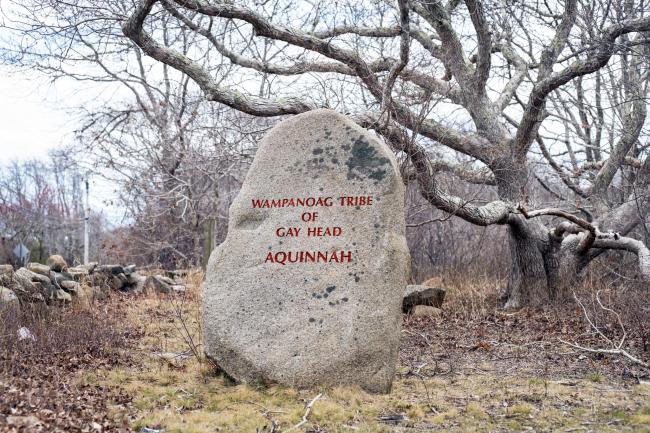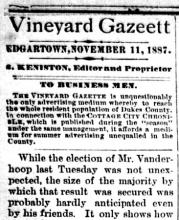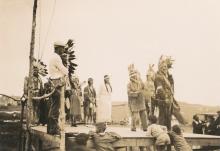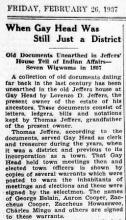By one vote short of a two-thirds majority, Gay Head voters last night ordered their selectmen to move forward toward turning the town Common Lands over to the Tribal Council.
The matter is far from an end, still. Ahead lie negotiation, General Court legislation, more town meeting votes, and possibly, countersuits.
But once the common land is transferred, the pending suit by the Wampanoag Tribal Council of Gay Head against the Town of Gay Head will be mooted.
And already, there are signs that the tensions which have torn the Island’s smallest town for the past few years are diminishing.
The meeting isn’t over. Well over half the warrant remains to be considered during the second session tonight.
Only once was the quiet decorum of last night broken by anything that even vaguely resembled the tempestuous outbursts and fiery rhetoric which, of late, have been almost continuous at the town’s official gatherings. When moderator Walter Delaney wandered from a pre-arranged schedule of speakers on the vital article, and allowed a motion to postpone indefinitely to reach the floor before Beatrice Gentry (or anyone else, for that matter) could speak to the article itself, Thelma Weissberg broke out with charges of sabotage.
It only lasted for a few moments, and voters pressed on through calm debate to defeat the postponement in a secret ballot by 51 to 35, and then pass the article itself in a roll call vote, 53 to 28.
A great deal of previous work had gone into keeping the meeting so smooth; perhaps the extraordinary presence of television cameras and off-Island newsmen in the assembly room had a further calming influence on the voters.
Some weeks ago Mr. Delaney had called a “pre-town meeting” at which voters debated the warrant more or less as it would appear before them at last night’s meeting; that disclosed pitfalls which might have tripped up last night’s meeting. For the first time, a public address system was available to overcome the serious shortcomings of the hall’s acoustics.
Whether pre-arrangement or not, the Tribal Council members themselves had quelled their differences and moved the article to a vote with only the subtlest traces of the division which has lately split the council itself.
The article directs the selectmen to “take the steps necessary to convey the Gay Head Common Lands...to the Wampanoag Tribal Council of Gay Head.” Just what the necessary steps are is not clear.
Last week, Mr. Delaney said that it would require an act of the state legislature to revise the town charter, which includes a clause providing for the Common Lands; another legislative act may be necessary to empower the town to give the lands away; and, Mr. Delaney said, another town meeting vote of a two-thirds majority would probably be required to actually seal the deal.
The legislative process would include public hearings at which anyone, not just Gay Head town voters, could speak, Mr. Delaney pointed out.
Last night, when Robert Stutz moved to postpone the article indefinitely, he said that the cloud cast across title to all land in Gay Head by the suit is causing the approach of a “financial crisis.” “Lord help any of us who have a family catastrophe, and who need to go to a bank for funds,” he said. “Passing this article will do nothing to relieve the crisis.” Title to the rest of the land is a legal question which should be settled in any resolution of the matter, he said.
Called upon by the moderator to clarify some of the legal issues involved, the tribal council’s attorney Thomas Taureen said a question would remain. The cloud, he said, can only be removed by federal legislation. “Am assurance from the Tribal Council wouldn’t clear up the question,” he said, “because the federal Indian Non-Intercourse Act [on which the Indian suit is based] prevents the Indians from transferring any claim they have.” He said, however, that in a recent meeting with the town’s attorneys, both sides agreed that a clarification of title to all lands would be desirable.
Mr. Stutz’s concerns were echoes by others: bu Yvette Eastman, Frances Tenenbaum, Hugh Taylor, Bruce Bailey, and Luther Madison.
But Tribal Council members and supporters didn’t argue the point. Milton Weissberg said, “the article is before us to determine town sentiment, not to immediately transfer the land,” and urged the voters that “the sentiment be determined this very evening.”
Later, he said there were two separate issues which shouldn’t be confused: the question of the Tribal Council’s repossession of the Common Lands, and the legal question of the non-intercourse act. What was before the voters, he said, was a matter of “local people trying to settle a local problem, right here tonight. The 1870 question is not in the article, and shouldn’t be.”
Mrs. Gentry and Mrs. Wenonah Silva, speaking for the Tribal Council, urged that the voters act to right a wrong done when the lands were taken from the Indians by the 1870 land setoff which accompanied the town’s incorporation, and that possession of the lands is important to the health of the tribe.
“As a tribe of Indians, we need these lands,” Mrs. Gentry said. Without the lands, the tribe is ineligible for federal health and education benefits, for federal help with economic development. “If the Common Lands are returned, we will take care of these lands as we have for 3,000 years,” she said.
Of the act of incorporation, Mrs. Silva said, “Whether a frivolous whom or a deliberate blow, it disregarded the will of the Native Americans in the Indian District of Gay Head, who had petitioned the state that this not be done, lest they lose their Indian identity.” Failure to pass the article, she said, would mean commitment to spend an indefinite sum in legal fees “to defend the reluctance of the voter to give to the Indian people what they rightfully own... It will impede progress in the scallop project, a program which will benefit all year-round residents of the whole Island.”
“The Indians have historically been cognizant that damage inflicted on their Mother Earth is but suicide. The native people are willing to assure all that no grid-work of small summer homes will destroy the sanctity of this land, contrary to opinions which have been disseminated, and thus alleviate the fear and apprehension of some,” she continued.
The assurance didn’t remove those fears, however. Mrs. Neil Howell, on behalf of the town conservation commission, offered an amendment which would keep the lands under regulation by the town zoning bylaws, and would assure public access to them for recreation. The motion was unsuccessful. Leonard Vanderhoop said, “there were no restrictions on these lands until our white brothers came here to live. We were willing that they should trample over our lands anytime,” he said, describing the days of his youth. “The Indians have always been fair, and will be fair,” he concluded.
Mrs. Bertha Giles said the lands are Indian Lands and can’t be governed by the town; Mrs. Silva assured the voters that the Tribal Council would not exclude non-Indians from the land unreasonably.
The roll call vote, taken by the town clerk as the voters trooped past her one by one, was a response by Mr. Delaney to a question raised by Mr. Bailey immediately before the article was called to a final vote. Mr. Bailey asked for a decision whether, since the Tribal Council members would benefit from passage of the article, their voting would constitute a conflict of interest. Mr. Delaney said he would disenfranchise no one, but ordered the roll call vote in case the article should be questioned later.










Comments